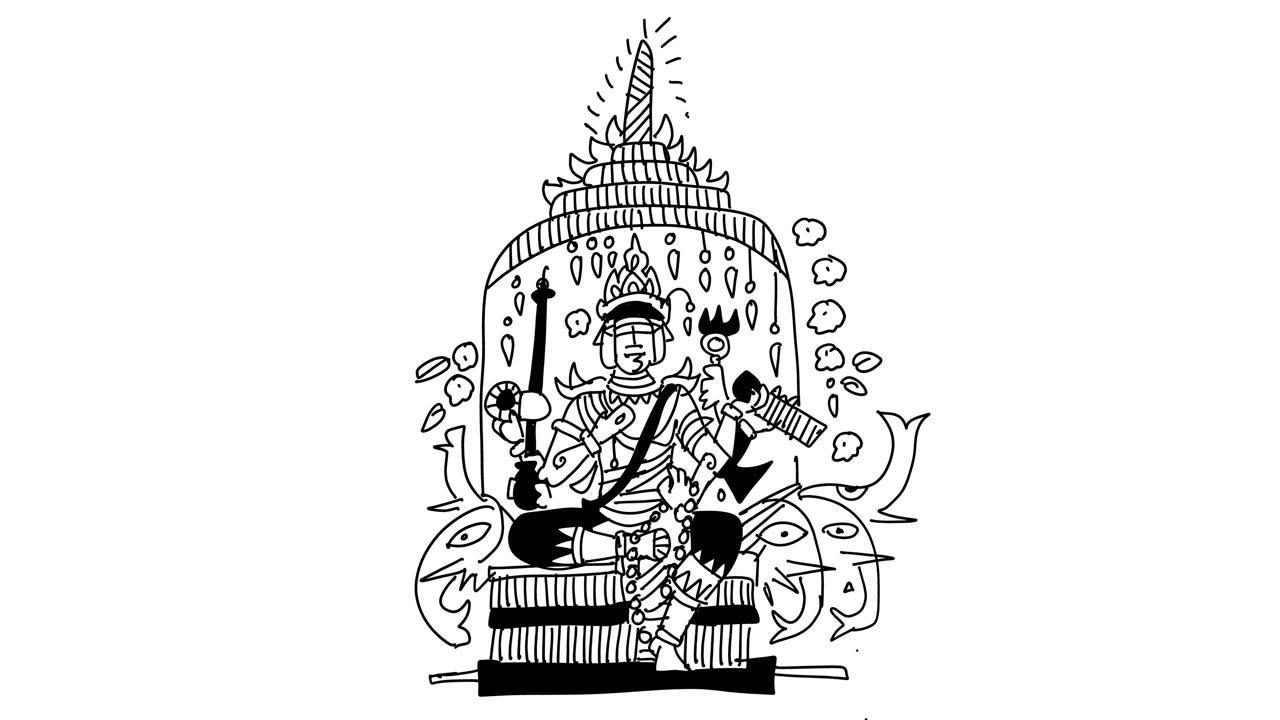Those who travel to Bangkok ignore all this. All they want is Thai-style partying, which is enjoying guilt-free, easily accessible forms of pleasure.

Illustration/Devdutt Pattanaik
 Thailand is amongst the few Asian countries that did not get colonised. It has its own unique form of Buddhism blended with the worship of gods with roots in Hinduism. It is also the first Asian states to accept same-sex marriage. Those who travel to Bangkok ignore all this. All they want is Thai-style partying, which is enjoying guilt-free, easily accessible forms of pleasure.
Thailand is amongst the few Asian countries that did not get colonised. It has its own unique form of Buddhism blended with the worship of gods with roots in Hinduism. It is also the first Asian states to accept same-sex marriage. Those who travel to Bangkok ignore all this. All they want is Thai-style partying, which is enjoying guilt-free, easily accessible forms of pleasure.
When you go to Bangkok, in the Sukhumvit area, you find a temple dedicated to a god called Erawan. The deity has four heads, eight hands, and he is associated with Brahma. The word Erawan is linked to Airavat, the elephant of Indra, and everything of the deity suggests that he could be Indra.
This deity probably travelled from the eastern coast of India, via Cambodia’s Khmer Empire to Thailand. This was the time when maritime trade took Buddhist and Hindu ideas and art across the sea. But here in Thailand, it takes its own particular version. These gods in Bangkok are what in Hinduism is known as sthala-devata, original guardians of local spaces, who need to be acknowledged and appeased by later occupants of the land.
A few decades back, at this site in Bangkok, a hotel was being built, but it faced several mishaps until following advice by local oracles, the owners of the plot built this shrine to Erawan. As soon as this was done, the building construction proceeded without any problems, after which the shrine became famous for fulfilling the wishes of people and removing all obstacles.
Today, when we go there, we find young Thai boys and girls, men and women, worshipping this deity with flowers, incense, candlesticks, fruits, flowers, jasmine and marigold. Two things stand out. One is the offering of singing and dancing. For a small fee, there are a set of women who sing and dance for the pleasure of the god. Thus, you offer the deity not just food and perfumes and clothing, you also offer him entertainment. While the performance is happening, you are allowed to pray and ask your wish to the deity. We find many Thais doing this. This practice resembles practices in many Chinese Taoist temples.
Even more unique is the fact that in the temple, you are allowed to wear shoes. There are no restrictions on who can enter. What draws people to the temple is not notions of purity and pollution. These ideas of purity and pollution are integral to India. India’s caste system is completely absent in Thailand. What you see here is genuine faith in a local deity who fulfils wishes.
We can of course trace it to Hinduism, but it remains a local, Thai version of faith. It reveals to Indians, the Hinduism which existed before Brahminical notions of purity and pollution came into the land. A time when temples belonged to everybody. Your footwear and your clothes did not offend the gods who were very happy with music, dance, perfumes, lamps, food and flowers that you offered them. In exchange, they offered you grace.
The author writes and lectures on the relevance of mythology in modern times. Reach him at devdutt.pattanaik@mid-day.com
 Subscribe today by clicking the link and stay updated with the latest news!" Click here!
Subscribe today by clicking the link and stay updated with the latest news!" Click here!








